- Home
- Lin Carter
Lin Carter - Down to a Sunless Sea Page 4
Lin Carter - Down to a Sunless Sea Read online
Page 4
Gliding on soundless steps to where she stood, staring up at the glory of the stars, the cowl of her robes concealing her features from him, he laid a cajoling arm about her shoulders and reached with the other hand for her breasts.
Startled, she turned in his embrace, and as she did so the hood of her robes fell back upon her shoulders, revealing the face of Zuarra.
Well, it was not the one he preferred, but it was all one to Agila. Grinning wolfishly, he insinuated one hand into the opening of her robes to capture a firm, pointed breast, while his other arm tightened about her so that she should not writhe free and his thin lips bent to seek her own in a hungry kiss���
A kiss that was never quite consummated.
A hand clamped his lean shoulder in a grip of iron; another closed about his throat, tearing him from the woman. Then a balled fist sank into his belly and he fell gagging to the sand, clutching for the long knife that slept in its dragonskin scabbard at his thigh, under his kilt.
But Brant kicked him in the face, knocking most of the fight out of the guide, who fell sprawling on his back and lay there gasping and spitting like a beached flounder.
Zuarra had fallen to her knees. Now Brant bent to help her to her feet, nor did she repulse his gesture.
For a moment, he held her against his chest as she clung to him, panting.
For a moment, her eyes, lustrous as wet dark jewels in the dim light, stared up into his own.
Then���
“This is the third time you have rescued me, O Brant,” she whispered. “First, when my own people had staked me out to die, and you, a stranger and a f’yagh, cut my bonds and gave me to drink of your own water. Then, when I swooned under the stare of the rock dragon, and my own ‘sister’ forbore to come to my aid. And now, when this hungry dog of the Outlands would have laid his hands and his mouth upon me against my will. Why do you do these things, O Brant?”
“Because I am a man, and you are a woman,” he said. To his own ears, the words sounded absurd and foolish, savoring of outmoded chivalry. But he could think of nothing else to say.
She stared at him.
“Am I truly a woman, then, O Brant?” she asked.
“Woman enough for me or any other man,” he said in thick tones.
She turned away without speaking and re-entered the tent she shared with the other woman. Brant looked around. While these few words had been exchanged, Agila had scuttled to the safety of his tent, avoiding further punishment.
Brant shrugged, and went to bed. But not to sleep. For the memory of huge eyes like lustrous, wet jewels haunted his restless thoughts almost till dawn… .
The Riders
After breakfast the next morning, Brant set Agila to digging a trench for their latrine.
He had briefly considered speaking to Will Harbin about the guide’s behavior, but dismissed the notion. He felt certain that Agila had learned his lesson and would leave the women alone. Nor did he exchange words with the guide, merely asking him to hand over the dirk the fellow wore, which the other did grudgingly and with a sullen look in his eyes. The long knife Brant gave to Zuarra for her own protection.
Then they sat beneath the awnings and watched as Agila, grumbling and spitting Martian curses under his breath, toiled for three hours at digging the latrine trench.
Brant and Harbin made a circuit of the encampment, studying the dust-soft sands. There were no markings to be seen about the limits of the protective fence, which suggested to them that the camp had been in no danger of beasts during the night. This relieved them of one worry, but another was not long in arising… .
In midmorning, Will Harbin, aided by Zuarra, went prowling up the ravine, searching for maritime fossils. About the same time, Brant, with Agila, went hunting for game. They rode out into the dustlands, and, finding naught, searched farther along the edges of the cliff, and brought down two fat reptiles whose meat would serve to replenish their larder.
Suoli was left alone to tend to the feeding of the lopers and the cleansing of the cookpots and utensils. These menial tasks she performed without complaint, but who could know what resentments smoldered within the depths of her being?
The day passed slowly, as the travelers rested from the exertions of their long journey. Brant and Agila returned at length to the camp with fat reptiles and fodder for the riding beasts; toward sunfall, Doc Harbin and Zuarra came back to the encampment, the Earthsider scientist jubilant over the discovery of rare fossils of marine life, the woman with little interest in such things, and relieved to be able to rest, after an afternoon of clambering about the rock-strata in search of lumps of stone whose import was incomprehensible to her.
Brant and Agila, during the hunt, had exchanged few words and had seldom looked at each other. As Brant had imagined would be the case, the Martian guide was subdued, saying little, never referring to the events of the previous night, and for his part, Brant had been equally reticent. They both knew about hunting, and simply did the job.
The evening meal that night was shared in silence, each busy with his or her own thoughts. Brant noticed that between Zuarra and Suoli was little converse and less interchange of looks than before. It would seem evident that between the two “sisters” loomed the failure of Suoli to come to Zuarra’s defense when the rock dragon had attacked.
Brant’s lips twisted in a private, bitter smile, but he said nothing.
Will Harbin, however, waxed voluble, after the meal, jubilant over the discovery of so many important fossils. This ancient ocean, he said, had been one of the largest and most important on all of Mars, and had served to link many significant and wealthy maritime nations eons ago. Among the fossil remains he had uncovered that afternoon were at least four previously unrecorded by Earthsider scientists.
Brant was not particularly impressed, and said little by way of comment. The rest of the meal was passed without further speech.
Once the beasts were seen to and the protective fence energized, the members of the party sought their rest.
Brant was just dozing off when he was roused to alertness
by the catlike scratching of long nails at the sealed flap of his tent. He spoke in inquiry, and the answer roused him in every sense of the word.
“It is Zuarra, O Brant���”
Loins tingling and blood surging high, the Earthsider sprang to his feet and covered his nakedness with a loose robe. He unseamed the tent and Zuarra slipped within.
Pulses drumming, Brant caught her in his arms, but she disengaged herself with agility.
“I am not come here for that purpose. Brant,” she said. Her voice was breathless and urgent, not seething with contempt, so he took no particular offense.
“What is it, then?” he demanded.
“Come outside,” she breathed.
He secured his garments, and buckled on the gun-belt, and followed her outside the tent. The starblaze lit the skies of Mars in scintillant glory, as ever, but the luminance thereof was dim, being moonless. He stared about.
“What is it, woman?”
She pointed wordlessly toward the ridgeline of the antique continent above where they camped.
“A watcher on the heights,” she whispered. “He has been there for the better part of an hour.”
Brant looked and saw the mounted man looming in dark silhouette against the glitter of a thousand stars. His jaw tightened and his face went grim.
“Who can it be?” he muttered under his breath, but the Martian woman heard his words.
“Someone who scouts for a greater number,” she said tersely. “But I know not for what purpose.”
“Bandits? Raiders? Outlaws?”
She shrugged. “Mayhap, O Brant.”
He thought to himself: Or slavers.
But it didn’t make sense to him, not completely. Slavers or bandits would have no particular reason to risk their guns for so small a party of travelers.
“Shall we wake the others?” Zuarra asked in low tones.
Brant shrugged. “I suppose so,” he said gruffly. *
Beside Brant’s brace of power guns and Zuarra’s long knife, they had only Will Harbin’s twin laser rifles wherewith to defend themselves against attack by the natives.
There were now two riders on the ridge above them.
“Who do you think they are, Jim?” asked Harbin. Brant said nothing, merely shrugged. There was no way to hazard a guess as to the identity of the riders. They could be anybody.
The thing was, there were no native clans encamped in these parts so near the southern pole.
The older man inquired of Agila his opinion. But the guide only made the Martian gesture that was equivalent to a shrug, voicing no opinion. He looked nervous and tense to Brant’s eyes, but the big man said nothing.
Suoli squeaked and fluttered nervously. Brant asked of Zuarra if she thought the riders were scouts of her people. He knew that if the Moon Hawk nation had discovered that the two women staked out to die had been set free by the hand of a f’yagh they might resent the interference enough to come after them. But somehow he doubted it. As did Zuarra.
“At this season, they are encamped to the north,” she said tonelessly, “in regions about Khorahd. Nor are such as Zuarra and Suoli important enough to merit pursuit, O Brant.”
Brant had thought as much, himself. Still and all, it did no harm to ask.
By moonrise the two riders had left the high ridge and were nowhere to be seen. Nor was there any further sign of them that night, although Harbin, Agila and Brant stood guard, each in turn, while the women slept.
With dawn, the travelers held a brief council, trying to decide what to do for their own protection. Brant pointed out that now that their camp had been discovered, they were exposed to danger. It would seem that the scouts had ridden back to join a larger force, but whether or not this force was interested in pursuing and attacking them was an unanswerable question.
No one had any better idea to present, so for the moment they decided to remain in their present camp, simply standing guard day and night against the chance of attack.
Neither that day nor all that next night, nor the following ilay did the unknown riders show themselves again. The travelers began to relax, seeming to have little enough to fear.
“Perhaps they were but travelers such as we,” suggested Zuarra over a frugal meal, “alert and wary in these untrav-cled regions, but uninterested in attacking us.”
Brant shrugged, saying nothing. But it was true than bandits or raiders would normally have little interest in so small a party as were they. And few native clans would risk the liarthsider power guns with so little to gain. After all, there were only three men, two women and three beasts… .
“Maybe it would be better to break camp under cover of darkness and move farther south,” suggested Doc Harbin. Brant thought about it briefly.
“Maybe, Doc,” he grunted. “But we have a secure position here, with our back to the steep cliffs. They can hardly come at us down the cliffs, for their beasts would find them hard to negotiate, and we could fire from below while their hands were busy guiding the beasts down. On the other hand, if they came after us while we were on the run, they would have us at a disadvantage.”
The older man nodded thoughtfully. “And, for that matter, why should they come at us at all, since we have done them no harm?” he said.
Brant agreed.
But he noticed the guilty flush that darkened the sullen features of Harbin’s guide.
For some reason, the man seemed afraid, did Agila.
But … why?
Watching Eyes
When they rose with dawn and left their tents to scan the ridgeline far above, it was empty. Whoever it had been that had spied upon their camp the night before had evidently moved on. Perhaps they had been mere travelers, after all.
But somehow Brant doubted it. Pessimist that he was, he had always found that when you anticipate the worst you are seldom surprised. But he said nothing of this to the others.
They busied themselves with the morning tasks, tending to the lopers, preparing a meal. And they were an oddly uncommunicative group, Brant had to notice. Agila performed his duties in a sullen manner, avoiding all eyes; Zuarra seemed lost in her own thoughts, while little Suoli kept timidly to herself and stayed out of her “sister’s” way as much as possible.
Even Harbin had little enough to say. He became lost in the pleasant occupation of fossil-hunting in the loose shale which lay heaped at the foot of the crumbling cliffs, and that afternoon he kept to his tent, sorting and classifying his finds.
Taking the lopers, Brant and Agila went hunting. It took them an hour and a little more to find a rock lizard, which they slew and skinned before returning to their encampment. While they were doing this, Brent scanned the ridgeline���it had become a habit, almost automatic, to do this by now.
And he saw four watchers. They were trying not to be seen, crouched low on the ridge, dark hooded robes blending with the harsh stone. Perhaps he would not have seen them at
ali had not the sunlight momentarily reflected from a glass
lens.
The watchers were using binoculars… .
All the rest of that day Brant felt the nape-hairs on his neck prickle under the scrutiny of those watching eyes far above. If the unknown watchers were raiders, outlaws, enemies of whatever nature, from the vantage of their height they could pick the members of the encampment off one by one with a laser rifle.
If they were armed with energy weapons, that is. Which they undoubtedly were. Brant’s thin lips twisted in a slight, sour and cynical grin: Colonial Administration law made it the highest of crime to sell guns to the natives, but the law was difficult, nearly impossible, to enforce. And Brant had run guns to more than a few of the native princelings in his time.
It would be a bitter irony if one of those guns were to slay him now, he thought with grim humor.
The women had prepared the evening meal earlier than usual. After they were through eating and had tended to the beasts, Brant sought out Harbin for a conference. He found the scientist still hunched over his fossils, examining them through a lens and from time to time making a brief entry in the small black notebook he carried.
“Doc, you got a minute?” he asked.
“Certainly. As a matter of fact, I could use a break,” the older man remarked, rubbing his eyes tiredly. He gave Brant a shrewd glance. “What’s up?”
Brant shrugged. “Small council of war,” he said. Then, as the older man listened without comment, Brant told him about the watchers on the height.
“Four of them now,” grunted Harbin, rubbing his lean jaw. “Who do you suppose they are, Jim?”
“No idea,” Brant admitted. “But they’re up to no good, that’s for sure. Ordinary travelers wouldn’t have hung around ever since last night, just to keep an eye on us… .”
“Well, they could hardly be the authorities, because we’re doing nothing illegal,” mused Harbin reflectively. “And, besides, I’ve never heard of the police riding the Highlands��� don’t they usually use aircraft?”
Brant nodded.
“So … they must be natives. But what could they possibly want from us? They must have their own lopers, so they shouldn’t be all that interested in stealing ours … true, the tents and weapons are of value, but���d’you suppose they could have seen the women? In those voluminous robes, a woman doesn’t look much different from a man. …”
“You’re thinking they might be slavers?” Brant said slowly. Of course, the same possibility had occurred to him. The older man nodded, then shrugged.
“Anything’s possible, here in the Drylands,” he remarked. “And they have to be after something!”
Brant shook his head slowly.
“It’s hard to believe even slavers would risk a fight with three armed men, just for a couple of women. Especially since they can’t have gotten a clear enough look at either of them to know whether t
hey’re young and attractive. After all, for all they know Zuarra and Suoli might be a couple of old crones we fetched along just to do the cooking.”
Harbin chuckled quietly at that. Then, sobering:
“Well, Jim, what do you think we ought to do about our nosey friends on the ridgeline?”
Brant had been considering that problem all day. “We’ve got three possible courses of action,” he said. “In the first place, we could simply sit here pretending we don’t know they’re there, while keeping on the alert, of course. That way we force them to make the first move … or give up and ride away.”
“But that means giving the initiative to our unknown friends,” Doc pointed out. “And if they mean to attack us, why should we give them the advantage of picking the best time���and ground?”
Brant nodded in agreement. “Right; so the second course would be to climb the ridge and confront them���taking them by surprise, sirice I don’t think they realize that we know they’re up there.”
“But they would see us climbing, and if they mean to pick a fight���for whatever reason���they could hardly wish for a more perfect opportunity. It’s hard to fight back when you’re hanging on to the wall of a cliff.”
“Yeah, there’s no question about that,” growled the younger man. “So … only thing left to do is sneak out under cover of darkness and put as much distance between us and them as we can, before they find out next morning that we have skedaddled.”
“So what’s your plan?” inquired Harbin.
“We make ‘em think we’re all bedded down for the night. Leave the tents up and some light going. Then we take the bedding, the supplies, mount up and ride out.”
“The nights get damned cold in these parts,” the scientist observed. “And they’ll seem a lot colder without the insulation of the tents.”
“I know, but they’ll have somebody keeping an eye on us, and if they see us striking the tents and packing our gear, that’ll be a dead giveaway. If they’re planning to pick a fight, they’ll have to do it then and there, before we put too much distance between us.”

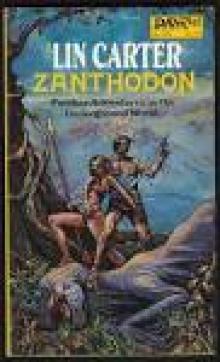 Zanthodon
Zanthodon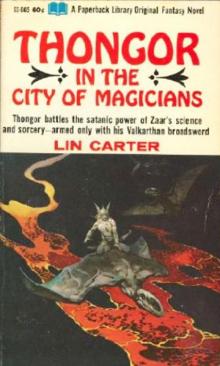 Thongor in the City of Magicians
Thongor in the City of Magicians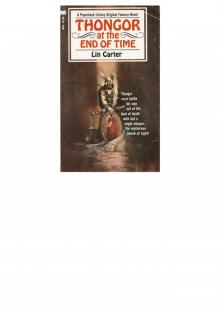 Thongor at the End of Time
Thongor at the End of Time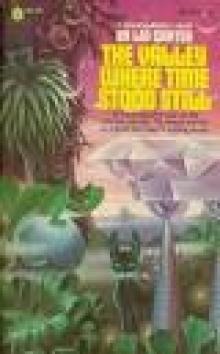 The Valley Where Time Stood Still
The Valley Where Time Stood Still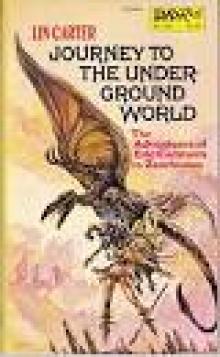 Journey To The Underground World
Journey To The Underground World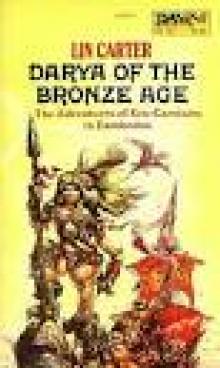 Darya of The Bronze Age
Darya of The Bronze Age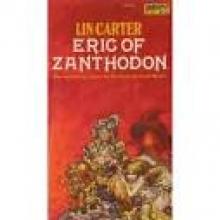 Eric of Zanthodon
Eric of Zanthodon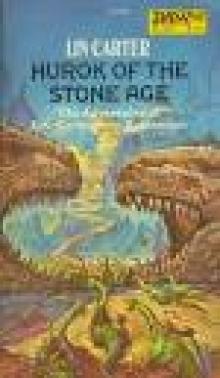 Hurok Of The Stone Age
Hurok Of The Stone Age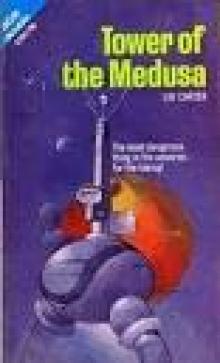 Tower Of The Medusa
Tower Of The Medusa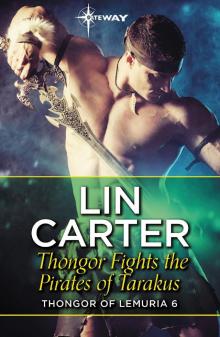 Thongor Fights the Pirates of Tarakus
Thongor Fights the Pirates of Tarakus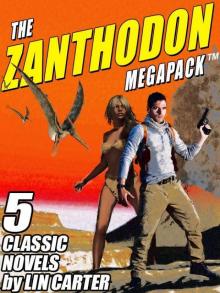 The Zanthodon MEGAPACK ™: The Complete 5-Book Series
The Zanthodon MEGAPACK ™: The Complete 5-Book Series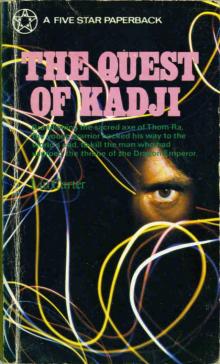 The Quest of Kadji
The Quest of Kadji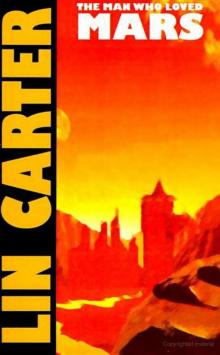 Lin Carter - The Man Who Loved Mars
Lin Carter - The Man Who Loved Mars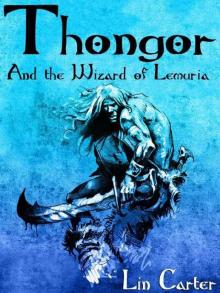 Thongor and the Wizard of Lemuria
Thongor and the Wizard of Lemuria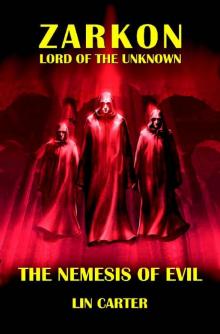 The Nemesis of Evil
The Nemesis of Evil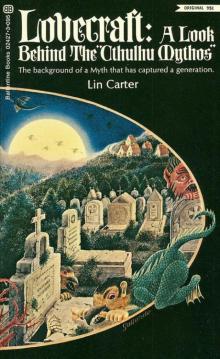 H.P.Lovecraft: A Look Behind Cthulhu Mythos
H.P.Lovecraft: A Look Behind Cthulhu Mythos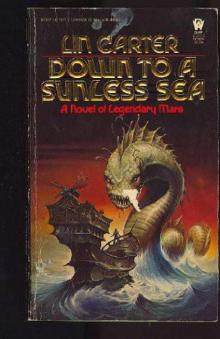 Lin Carter - Down to a Sunless Sea
Lin Carter - Down to a Sunless Sea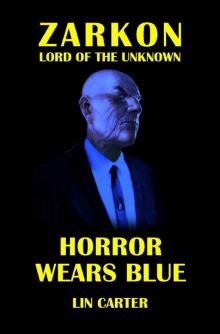 Horror Wears Blue
Horror Wears Blue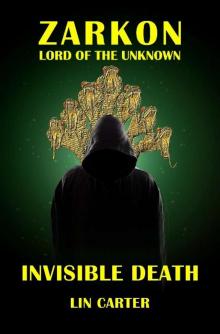 Invisible Death
Invisible Death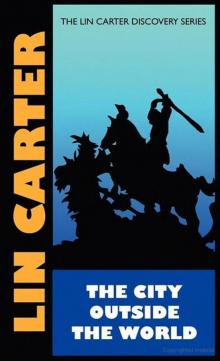 Lin Carter - The City Outside the World
Lin Carter - The City Outside the World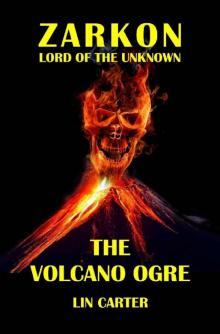 The Volcano Ogre
The Volcano Ogre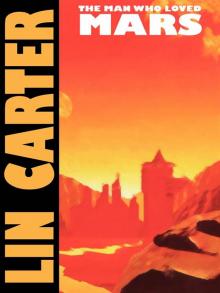 The Man Who Loved Mars
The Man Who Loved Mars